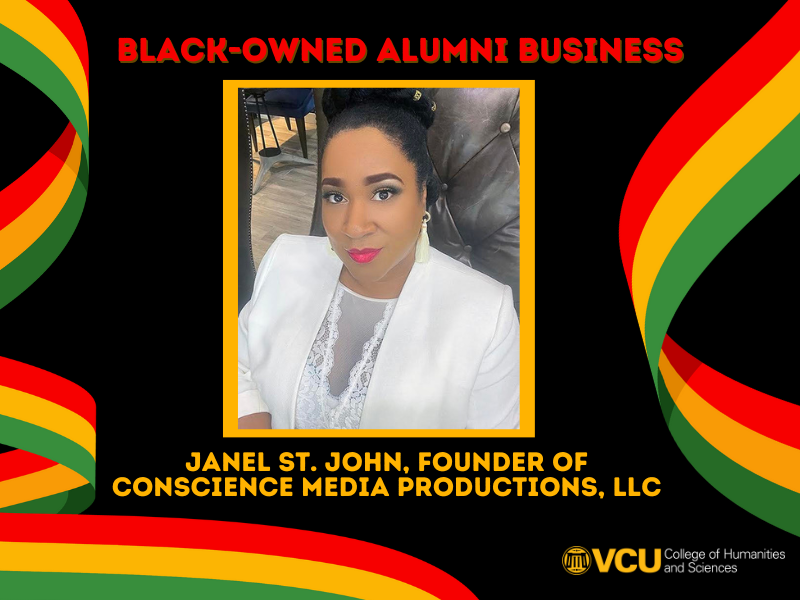Meet Janel St. John, founder of Conscience Media Productions, a creative agency that is committed to connecting with African American audiences. Learn more below.
Can you describe your business and its goal?
Conscience Media Productions, LLC. is a creative agency that 1.) Creates platforms to showcase the talents, stories, perspectives and remarkable achievements of artists of color; 2.) Assists companies with publicity campaigns to help them make authentic connections with African American audiences.
I originally founded CMP, Inc. in Columbus, OH in 2000. I ran the company full time from 2003 until 2010, launching an art and culture magazine, a radio show and podcast and gaining upwards of 60 advertisers and marketing communications clients. In 2005, the Office of Mayor Michael B. Coleman presented CMP with an ‘Excellence in Business Award.’ We handled the public and media relations, print design and sponsorship for the City of Columbus Black History Month Celebration for eight years. After the recession, major life changes and moving back to VA, the business was dissolved by 2013. I reincorporated CMP in VA in 2020 as an LLC.
What inspired you to start your company?
I was inspired to start CMP while working as a morning radio show host in Tidewater in 1998. The content on Black radio was not only not intelligent enough for me…it was overly focused on entertainment. Tidewater was now the second radio market I’d worked in, having started on-air in Richmond. So I saw a pattern. I began to produce NPR-style, special feature reports that included interviews with artists and filmmakers, etc. for my show. Within one month, the sales department had monetized all of my special reports which now had sponsor (‘brought to you by’) tags on the end. I felt if they could sell my reports to advertisers, I could produce content and sell it directly to independent radio stations across the country, who could, in turn, monetize them. I saw a market opportunity: Black radio had a need for content and advertisers wanted to be attached to impactful programming. That’s what I did well! I launched CMP with the goal to produce intelligent multimedia content for African American audiences.
What is something that you wish you would have known before starting your business?
I wish I knew how the digital revolution was going to impact media. Almost overnight, the ways in which we historically consumed media, shifted, leaving the media makers of my generation (X) reeling and forced to turn on a dime. Now, 10 years later, these things are the biggest benefit to CMP. But it took some years ‘fumbling in the dark’ to get here.
How did VCU prepare you for this career?
Almost everything I learned about producing media, I learned at VCU. After I entered the workforce, I found out that my skills were above and beyond my mass communications counterparts from other institutions. As a mass comm major with a focus on television, I had to take radio and journalism as well. So I learned all three tracks. Other institutions only required their students to take courses within their track. I learned how to produce a ‘man on the street’ by splicing radio tape with a straight razor. My employer was shocked that I could do that. It made my radio reports and promos top-notch. In 1998, I won ‘Best LIVE Radio Interview of the Year’ from the Hampton Roads Black Media Professionals – the local chapter of the National Association of Black Journalists. When I was hired as a newspaper reporter, I was promoted to arts and entertainment editor and then to interim managing editor, in just two years.
Again, my boss was overjoyed that I was also a photographer, which meant that I could travel to press events solo. So, I rose quickly through the ranks at media jobs because I had already had a solid, well-rounded foundation. I left VCU, a one-person, walking media house.
What is the hardest part about being an entrepreneur? Best part?
The hardest part about being an entrepreneur is the rejection that comes in two parts. No entrepreneur is immediately successful. You will receive a hundred nos before a single yes. When you’re selling someone else’s product, there’s no intimate connection to it. But when you’re selling something that you created, with your own money, and put your blood, sweat and tears into it…the rejection hits different. It’s very personal and requires a tough skin. Next, you will be rejected by your 9-5 colleague and friend groups. Your new obsession will force you to have to develop new colleagues/friends who are also entrepreneurs. Because this takes time, you may have to function for a season without a social or support system.
The best part of being an entrepreneur is seeing a vision come to life! By the time you make it there, your dream has become your career - there’s no glass ceiling, no salary cap and you have the freedom to manage your time. There’s nothing better than doing life on your own terms.
Where would you like to see your business in 5/10 years?
Number 1: I would like to return to working full time in the business again. I would like CMP to be a major player in reshaping the narrative of American history and mitigating the impact of the dissolution of DEI initiatives. These untold stories of artists of color have the power to inspire, heal and unite humanity. I hope to collaborate with brands committed to social impact to help magnify our efforts. I also expect to launch a non-profit arm of the business to help other female entrepreneurs.
